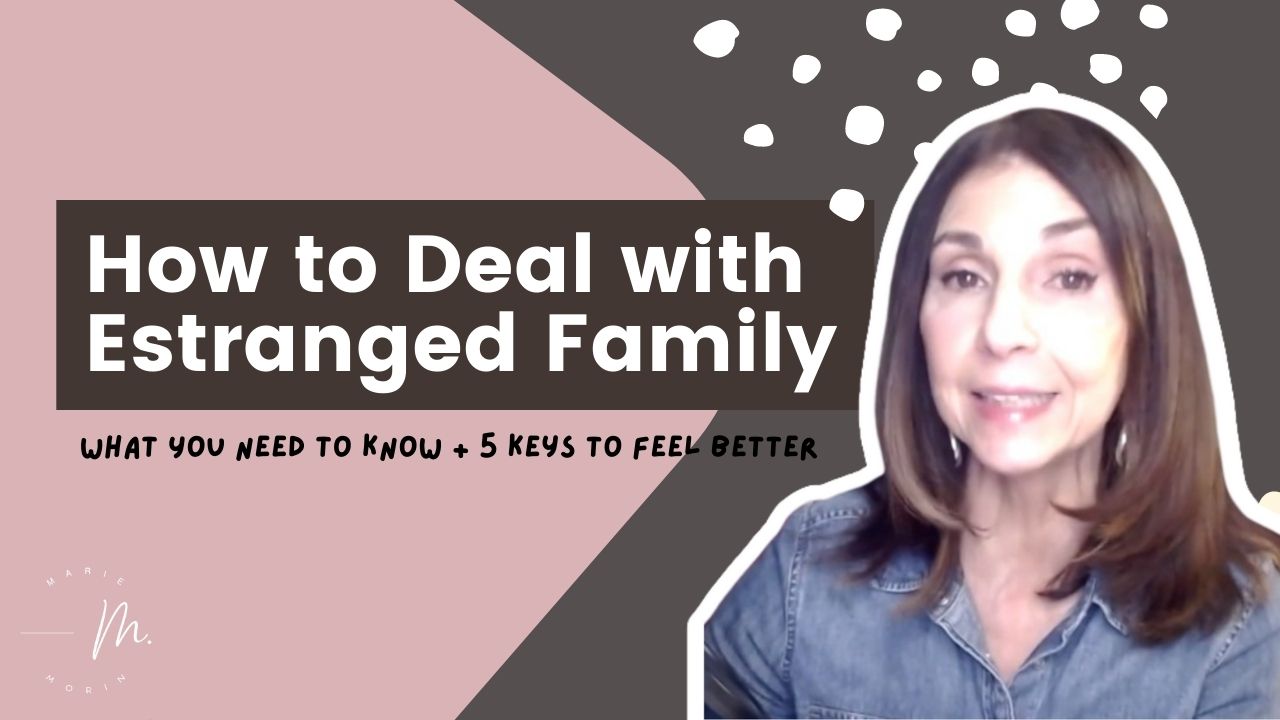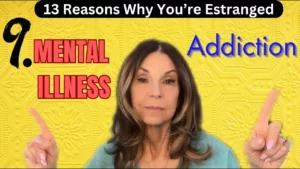Family estrangement hits more than one-quarter of the U.S. population, and with all the shame and secrecy it causes, the actual number is likely much higher. The condition of being cut-off causes physical and emotional harm. Maybe you feel abandoned, shunned, scorned, alone, guilty, or ashamed, which causes chronic stress. This article shares with you how to deal with family estrangement, what you need to know now, and FIVE tips to feel better.
“Estrangement is a complex topic that deserves to come out of the shadow of secrecy. “
Estrangement is the state of being alienated or separated in feeling or affection, a state of hostility and unfriendliness. Estrangement is the state of being separated or removed.
What’s Involved with Estrangement?
Estrangement can occur on a spectrum where there can be physical contact and emotional distancing to the extreme of no emotional and physical contact. You may see the estranged family member, but there is no emotional connection. You may not see them but have occasional contact through emails or texts. You may have no contact at all.
Estrangement can happen in stages. There may be a slow distancing happening for a while. An event may occur that breaks the camel’s back, or maybe nothing eventful, just a halt in communication.
Estrangement can be present in generational patterns where it is common to cut someone off. Your family may have cut off their family members. A perception that someone’s behaviors are intolerable may have been present.
Estrangement may have occurred in families with abusive behaviors, substance use, mental illness, and often strained family conflict. There may have been a history of domestic verbal or physical abuse.
Estrangement may result from parental alienation. One parent paints the other negatively and influences the child, so they perceive the parental relationship with the alienated parent as unnecessary and or unwanted.
Estrangement may result from ineffective communication skills. The absence of behaviors such as apologizing, taking responsibility, respecting one’s rights, and the need to cool off turn into insults was common. Hurtful words and unforgivable injuries occur. When families do not have these skills to apologize, and there is no resolution, it sets an atmosphere for one to cut off from them.
Estrangement often involves differing values and lifestyles. For one or more parties, these differences are irreconcilable. There may be rigid standards, intolerable words and deeds, and harmful judgments.
Unfulfilled expectations by parents, children, or siblings often participate in estrangement. There may be an undertone of disappointment in the performance of the other. Perhaps, there are messages of one not doing or being enough. The person who feels he can never measure up can perceive these messages as rejection.
A combination of these elements likely exists. Perceptions, how you view the condition, play heavily and may not be apparent to the other. Estrangement, however, causes emotional strain and participates in illnesses, and even exacerbates chronic disease.
Estrangement is extremely painful.
Can we Talk?
Perhaps you think that if you could reconcile, everything will be ok, and then you can feel good again. When we are estranged, the condition leaves your hopes up to their decision. You cannot predict or coerce anyone to reconnect with you. Unfortunately, you do not know what will happen.
Consider that while wanting reconciliation is what you want, it may not be what your loved one wants. In time, there may be reconciliation, but what will you do until then?
The uncomfortable gap, or limbo state, and how you manage your state of stress deserves attention. You don’t have control over your loved one, and if it’s one of your adult kids, you have even less power. You can’t pull the I’m your parent card. Whatever their perception, it is likely excruciating for you and unfair, but it’s what you need to accept and manage.
If your loved one has asked for space, respect it for a time. Resume your attempts with thick skin.
Try not to be offended and consider how you can better understand what they are experiencing. Grow your empathy muscle for others. It’s their perceptions. And it’s essential to consider your estranged relationship in the context of their feelings as well as yours. When you are stressed, and if what you want is to reconcile and your loved one is disinterested, there are some things you can do while you wait.
5 Keys To Feeling Better
1. Be Informed
The condition of estrangement is complicated. Having information builds a foundation for managing your future regarding your loved ones. Read about the other’s perspective so you can find your common humanity. You will find that understanding other stories will bring a level of comfort. You are not alone.
Understanding will help you grow your empathy muscle, which is very different from enabling. When we walk in another’s shoes, we can better validate their perspective. Empathy will help you when you attempt to reconcile. When you are overwhelmed by hurt, it isn’t easy to see the scope of what occurred. Your commitment to learning will benefit other relationships as well.
Kylie Agllias, a social work researcher and educator, writes extensively about the estranger’s perspective. Her book, Family Estrangement A Matter Of Perspective, discusses why people decide to cut off.
Dr. Karl Pillemer researched nearly 1400 people with estrangement stories. His book, Fault Lines Fractured Families and How to Mend, also tells how individuals successfully reconciled.
Dr. Joshua Coleman’s book Rules of Estrangement includes an excellent preparation guide for negotiating. Being informed will build your empathy muscle, but you will gain insight into how you participated in the condition.
2. Commit to Daily Self-Care
Practicing daily self-care is more than relaxing in front of the television to defrag. It’s an intentional commitment to fill your reservoir. When we have relational stress, it wears on us, so we need to be sure to fill our cups. You can either do a morning intention, prayers, guided meditations, exercise, breathing techniques, and be around the people you enjoy. Do what pleases you daily. Self-care allows us to nurture and heal. Prayers and having faith in God can be very comforting.
Don’t neglect your basic health needs by drinking enough water, making healthy food choices often, sleeping well, daily movement, and getting fresh air and sunlight. Sleep is when you restore and fill your reservoir. Sleep hygiene, going to bed around the same time, screens off at least an hour before bedtime, doing something relaxing before bed, listening to a meditation, minimizing your caffeine intake after your morning cup. A good night’s rest helps us feel better and think more clearly. If you’re having trouble sleeping, speak to a professional for help.
3. Explore Your Secret by Practicing Emotional Visits
Emotional visits are indefinite periods, so you can allow yourself to feel acceptance. It’s uncomfortable to have estrangement in your life. The onslaught of big feelings requires time to sort out your emotions. There is no right or wrong way. Consider making a favorite cup of tea, grab a journal if you like, and let yourself feel. Be compassionate, and if you need to cry, groan, let it be.
Spend as much time as you need; rest when you feel a release. When you are ready, do something you like to do. You may want to take a walk, call a friend, go shopping, watch a good movie, eat chocolate, whatever you want. Then go back to your emotional visit on another day.
This exercise allows you to ventilate. Processing the gravity and loss of estrangement is a necessary step we cannot afford to skip. Remind yourself you are doing the best you can, and you did the best you could.
Be sure to bring your most compassionate self with you during an emotional visit. Essentially, you are helping yourself to grieve and move forward. This skill will help you to set designated times so your days can include living despite your painful condition. Remember, your secret will lose its power when you process your feelings.
What if you find yourself stuck in either self-criticism, regret, anger, blame, and unrelenting depression and or anxiety?
4. Find Support
Negative self-talk, ruminating, excessive worry, and depression exist in limbo. There is no way of knowing when others will behave differently. If our pain has shifted to suffering, it’s time to get help. Estrangement for some is worse than losing someone to death. Complicated grief is ongoing, unrelenting mourning that stalls you from healing. It exacerbates stress to epic proportions. There is no shame in getting help. Support is having someone in your corner to have a safe place to vent. Your secret will find a safe place to express. They will help you make sense of what has happened, guide you gently, and offer non-judgmental assistance. You will learn communication skills, assess and treat anxiety and depression, and guide you toward healing.
5. Awaken Your Gratitude
Practicing gratitude is the best mood lifter and mindset shifter. The more we indulge in appreciation, the more we see the glass as half full. Gratitude has a fantastic effect on those that decide to practice or implement virtue. Gratitude requires us to stop and notice the beauty around us and then make an effort to slow down. You can journal, list 3 to five things that went well for you, and recall someone you are grateful for. A powerful practice is to recognize one person or something you are thankful for and feel the sensation of gratitude for two minutes. This action will release your brain’s feel-good chemicals, dopamine, and serotonin. Consider doing a 21 Day Gratitude Journal Challenge.
Estrangement is intensely stressful and heartbreaking. The hope within you to have the desires of your heart is real. The gap is with you, and attaining what you desire most is uncertain. Commit to building your foundation to prepare you for the uncertainty now and addressing possible reconciliation. You are not alone, and you will benefit from practicing self-care and compassion. Treat yourself as you would a good friend. You are doing the best you can. Align yourself with the people you find joy with. Practice gratitude, and let your story be about your getting through finding happiness again. This article discusses How to Deal With Family Estrangement, What you Need to Know, and Five Keys to Feeling Better.
Get The eBook: Feeling Heartbroken and Alone? How to Pick Up the Pieces When You are Estranged.
Resources:
- Agllias, Kylie. Family Estrangement A Matter Of Perspective. New York, Routledge, 2017.
- Coleman, Joshua. Rules of Estrangement. New York, Harmony Books, 2020.
- Morin, Marie. Feeling Heartbroken and Alone? How to Pick Up the Pieces When You are Estranged. eBook. 2022.
- Morin, M.L. [Morin Holistic Therapy]. (2022, January 4 ). What is Family Estrangement? You Are Not Alone.
- Morin, M.L. [Morin Holistic Therapy]. (2021, September 8). Diaphragmatic Breathing: 5 Minute Deep Breathing Exercise for Beginners.
- Morin, Marie. How to Deal with Estranged Family During the Holidays (2021, November 21) Sixty and Me. https://sixtyandme.com/estranged-family-holidays/
- Pillemer, Karl. Fault Lines Fractured Families and How to Mend Them. New York Penguin Random House, 2020.









